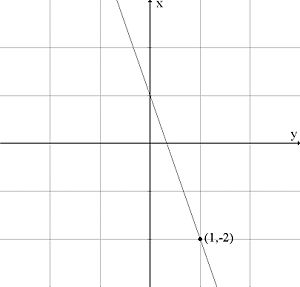Solution 2.2:5b
From Förberedande kurs i matematik 1
(Difference between revisions)
m |
|||
| Line 1: | Line 1: | ||
| - | Because the straight line is to have a | + | Because the straight line is to have a slope of <math>-3</math>, its equation can be written as |
| - | <math>-3</math>, its equation can be written as | + | |
| + | {{Displayed math||<math>y=-3x+m\,,</math>}} | ||
| - | + | where ''m'' is a constant. If the line is also to pass through the point (''x'',''y'') = (1,-2), the point must satisfy the equation of the line, | |
| + | {{Displayed math||<math>-2=-3\cdot 1+m\,,</math>}} | ||
| - | + | which gives that <math>m=1</math>. | |
| - | <math>m | + | |
| - | + | ||
| - | + | ||
| - | + | ||
| + | The answer is thus that the equation of the line is <math>y=-3x+1</math>. | ||
| - | <math>-2=-3\centerdot 1+m</math> | ||
| - | |||
| - | |||
| - | which gives that | ||
| - | <math>m=1</math>. | ||
| - | |||
| - | The answer is thus that the equation of the line is | ||
| - | <math>y=-3x+1</math>. | ||
| - | |||
| - | |||
| - | {{NAVCONTENT_START}} | ||
[[Image:1_2_2_5_b_ss1.jpg|center|300px]] | [[Image:1_2_2_5_b_ss1.jpg|center|300px]] | ||
| - | {{NAVCONTENT_STOP}} | ||
Current revision
Because the straight line is to have a slope of \displaystyle -3, its equation can be written as
| \displaystyle y=-3x+m\,, |
where m is a constant. If the line is also to pass through the point (x,y) = (1,-2), the point must satisfy the equation of the line,
| \displaystyle -2=-3\cdot 1+m\,, |
which gives that \displaystyle m=1.
The answer is thus that the equation of the line is \displaystyle y=-3x+1.

